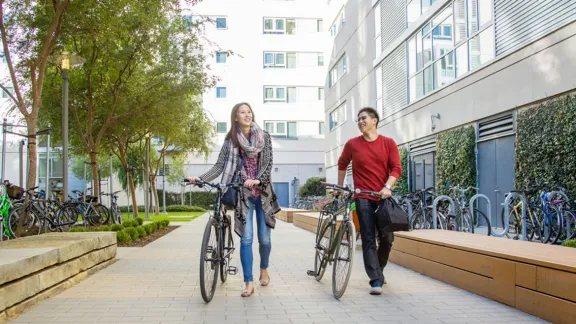
Tackling UCSF's Housing and Transportation Crisis
Housing and transportation are two of the biggest issues facing students. Many could not imagine that finding affordable places to live and ways to get around would be such a large part of being at UCSF and in San Francisco. The Associated Students of Graduate Division (ASGD) hosted a town hall last November at Mission Bay with key university administrators from housing, transportation, and campus life services to allow students to voice concerns, opinions, and ideas. (The entire town hall can be watched here.)
With the year coming to an end, let’s revisit some of the key points from the town hall and highlight exciting things to look forward to in the upcoming year.
Auxiliary Entities
In the greater university structure, housing, transportation, and several other services such as fitness and recreation, and facilities are considered auxiliary entities. That means that these groups are to be self-sustained with their budgets generated from payment for the services provided, which is important since there’s limited funding to ease the cost of living crisis in San Francisco. For example the housing budget comes from monthly rents and transportation primarily from parking costs.
Housing
UCSF is focused on increasing the amount of available housing in the long term. With the current housing stock of 672 units available, there is an estimated shortfall of 600-900 units. The hope is to have new housing built by 2019 starting with the recently purchased property on Minnesota street in the Dog Patch. This will be followed by phase 1 of the conversion of UC Hall on the Parnassus campus into housing in 2021, followed by the construction of housing units downtown in a partnership with UC Hastings in 2022 and 2025, and lastly, phase 2 of the conversion of UC Hall and Millberry Union in the late 2020s (See a complete breakdown here.)
The University is also looking to help current students with housing by holding a master lease in Bayside Village. However, with the logistical concerns and the cost of around $1 million per year to subsidize rent for just 50 students, this option is not the most sustainable. Housing administrators have also explored more creative approaches such as having students live on a cruise ship in the Bay, but monetary and logistical concerns were never worked out.
Transportation
Shuttles: UCSF transportation is constantly looking to improve the commuter experience. As such, commuters should expect more ordered boarding and increased service on the busier lines in addition to more reliable onboard WiFi. Evening Parnassus and Mission Bay shuttles should see a pilot expansion beyond the one-mile radius to accommodate students that are forced to live further from campus.
Also, a partnership with Lyft or Uber is being explored to determine what areas could benefit from transportation coverage on evenings and weekends. With the annual costs of a single shuttle at over $150,000 per year, this on-demand program could help students who need shuttle service on weekends and in the outer reaches of the city at a fraction of the cost.
Muni Passes: Muni requires that subsidized passes be revenue neutral. Therefore, the entire student body would need to buy in to push the cost of a monthly pass to under $40. The last time a referendum was attempted, a majority of the student body voted against the mandatory purchase of a muni pass since students who commute by other means opposed paying for a service they seldom used. It will be interesting to see if the current crop of students feels differently
Bike Security: With the new surge in bike thefts from the Mission Bay garage, bike security has been a popular topic. Transportation acted swiftly to improve the locks at the Mission Bay garage and are looking for any tips to help further protect student bicycles.
In a follow-up survey, 86% of town hall attendees said they felt that their questions and concerns were moderately to completely addressed. Arguably, the most poignant questions that arose was what should UCSF prioritize? Shuttles? Short term housing? Public transportation subsidies? Biking infrastructure? Students will have a say next year as ASGD asks for support in narrowing and unifying a discrete student message to the administration.


